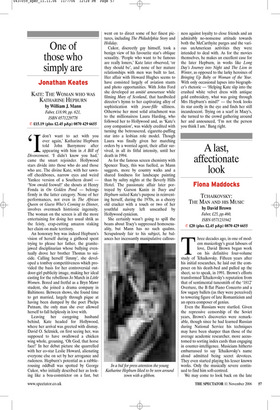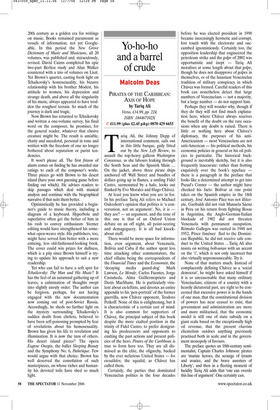A last, affectionate look
Fiona Maddocks
TCHAIKOVSKY: THE MAN AND HIS MUSIC by David Brown
Faber, £25, pp.460, ISBN 0571231942
✆ £20 (plus £2.45 p&p) 0870 429 6655 Three decades ago, in one of modern musicology’s great labours of love, David Brown began work on his definitive four-volume study of Tchaikovsky. Fifteen years after his initial researches, he laid out the composer on his death-bed and pulled up the sheet, so to speak, in 1991. Brown’s efforts transformed Tchaikovsky’s reputation from that of sentimental tunesmith of the ‘1812’ Overture, the B flat Piano Concerto and a few sugary ballets (as they were perceived) to towering figure of late Romanticism and an opera composer of genius.
Even the Russians were startled. Given the repressive censorship of the Soviet years, Brown’s discoveries were remarkable, though since he had learned Russian during National Service his techniques may have been sharper than those of the average academic researcher, more accustomed to sorting index cards than engaging in counter-intelligence. Musicians hitherto embarrassed to say Tchaikovsky’s name aloud admitted being secret devotees. They even started playing his lesser known works. Only the musically severe continued to find him soft-centred.
We may come to look back on the late 20th century as a golden era for writings on music. Books remained paramount as vessels of information, not yet Googleable. In this period the New Grove Dictionary of Music and Musicians, all 20 volumes, was published and, miraculously, revised. David Cairns completed his epic two-part Berlioz study and Alan Walker countered with a trio of volumes on Liszt. Yet Brown’s quartet, casting fresh light on Tchaikovsky’s homosexuality, his bizarre relationship with his brother Modest, his attitude to women, his depression and strange death, and above all the singularity of his music, always appeared to have trodden the roughest terrain. So much of the journey is dark and tragic.
Now Brown has returned to Tchaikovsky and written a one-volume survey, his final word on the composer, he promises, for the general reader, whatever that elusive creature might be. The result is amiable, chatty and anecdotal, personal in tone and written with the freedom of one no longer bothered about reputation or purist tendencies.
It won’t please all. The first frisson of alarm comes on finding he has awarded star ratings to each of the composer’s works. Three pieces go with Brown to his desert island (have your own guessing game before finding out which). He advises readers to skip passages which deal with musical analysis and continue with the biographical narrative if that suits them better.
Optimistically he has provided a beginner’s guide to music theory, including a diagram of a keyboard. Hyperbole and superlative often get the better of him in his rush to convey enthusiasm. Sterner editing would have strengthened his somewhat open-weave style. His publishers, too, might have served him better with a more enticing, less old-fashioned-looking book. The cover could win prizes for dullness, which is a pity since Brown himself is trying to update his approach to suit a new readership.
Yet who can fail to have a soft spot for Tchaikovsky: The Man and His Music? It has the feel of an autumnal gathering up of leaves, a culmination of thoughts swept into slightly unruly order. The author can be forgiven, perhaps, for not having engaged with the new documentation now coming out of post-Soviet Russia. Accordingly, he sheds no further light on the mystery surrounding Tchaikovsky’s sudden death from cholera, believed to have been self-poisoning prompted by fear of revelations about his homosexuality. Brown has given his life to revelation and illumination. It is now the turn of others. His desert island pieces? The opera Eugene Onegin, the ballet Sleeping Beauty and the Symphony No. 6, Pathétique. Few would argue with that choice. Brown has well deserved the consolation of such masterpieces, on whose riches and humanity his devoted toils have shed so much light.



































































































 Previous page
Previous page